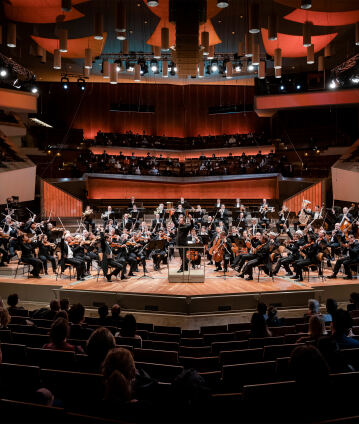Kirill Petrenko conducts Tchaikovsky and Rachmaninov

Rachmaninov’s late-Romantic Second Symphony is filled with the wistful melancholy typical of the composer. Today it is one of the Russian composer’s most popular works, and the symphony also has a special significance for Kirill Petrenko: having chosen the Second for his debut with the Berliner Philharmoniker in 2006, he conducted it again 15 years later as the orchestra’s chief conductor. It was preceded by Pyotr Ilych Tchaikovsky’s Romeo and Juliet.
After the traumatic fiasco of his First Symphony, the Second, whose premiere Rachmaninov conducted himself in St Petersburg in 1908, was a critical success. Today it is by far the most popular of the composer’s three works in this genre. Like all his symphonies and piano concertos, this epic work is also in a minor key and – particularly during the familiar slow movement, with its expansive clarinet solo – is filled with the melancholy and longing so typical of Rachmaninov. Equally effective is the second movement, which in addition to intimate melodies also contains echoes of the Dies Irae motif quoted by Rachmaninov in many of his works.
The second work on the programme was Pyotr Tchaikovsky’s fantasy overture Romeo and Juliet. Mily Balakirev, the leader of the group “the Mighty Handful”, known in English as The Five, had suggested the subject to the composer. Although Tchaikovsky was already a professor of composition when he wrote the work, he had to put up with criticism such as the following from the autodidact Balakirev, who was only a few years older: “With regard to its deficiencies, namely its form, the overture still needs revising.” Tchaikovsky actually did revise the composition several times, although, as Petrenko pointed out in an interview for the Digital Concert Hall, during the process he increasingly emancipated himself from the influence of his severe critic.
The concert in front of 1000 spectators took place as part of the Berlin project “Perspektive Kultur”. The aim of this project was to test the logistical and practical feasibility of events in conjunction with SARS-CoV-2 antigen testing.
© 2021 EuroArts Music International, SWR / Arte
Related interviews
Artists
Our recommendations
- Kirill Petrenko conducts Beethoven, Brahms and Schoenberg
- Season opening 2022: Kirill Petrenko conducts Mahler’s Seventh Symphony
- Kirill Petrenko conducts Strauss’s “Elektra”
- Kirill Petrenko conducts Tchaikovsky’s “Queen of Spades”
- 2023 New Year’s Eve Concert with Kirill Petrenko and Jonas Kaufmann
- Kirill Petrenko conducts Mendelssohn and Shostakovich